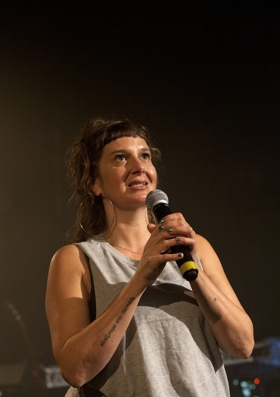Guest Blog: Annie Siddons On DENNIS OF PENGE

In early 2016 I got sober, and in order to help my sobriety, started writing articles for a sobriety website. I noticed that all the other articles seemed to paint an entirely positive picture of sobriety. (My skin is so glowing! I have so much energy! I look so young! I've lost so much weight!)
There are obvious reasons for that - encouragement, for instance - but to me, it seemed important to share the difficulties as well as the positives with other early sober people. One of the hardest things I found about early sobriety was the debilitating and medievally demonic depression that overtook me for the first six months.
This depression was much more savage than the consequences of using had been, and those six months, trying to stay afloat as a single mother, hustler and freelance creative, were HARD - and I was a massive liability.
Later, this was replaced by the strain of not feeling the release and disinhibition of substances - of never being OUT OF MY HEAD - and having to retrain myself to feel those things without them. It seemed like such hard, tedious work. It seemed that in the sobriety literature, no one was talking about this either.
I started writing about looking for Dionysus - the Greek God of transcendence and ecstasy, who I renamed Dennis - in various experiences I made herself undertake. At the same time, I read Johann Hari's book on addiction, Chasing the Scream, which controversially posits that addiction is not in fact a progressive disease but a symptom of a lack of connection, and Gabor Mates in the realm of hungry ghosts, which also suggests more holistic causes and remedies for addiction.
Having been obsessed by Target Culture and its nefarious influence on our whole social structure and sense of ourselves since watching Adam Curtis's The Trap, and seeing and experiencing its inhumane results in the mental health and benefits system at first hand, I wanted to ask what happens to people in the system when they are deemed well enough to leave it - but without a structure or community to support them.
An unrepentant Londoner by birth and choice, I wrote an ode to London in my last show, How (Not) to Live in Suburbia, and in this show, I focus in on my childhood in Penge, one of the last ungentrified places in London, but rapidly changing.
%20(3).jpg)
My previous show was unabashedly autobiographical, and this time I wanted to create an epic, mythical, heroic tale without me in it. Wendy and Hortense are based on real people from my childhood and Dennis is also based on a composite of childhood friends, so there is a lot of me in this show, but it's not about me.
Also, in showbiz terms, I wanted to set myself a challenge; this is a much bigger show than my last. It's twice as long - it has an INTERVAL - and it has three people on stage instead of two.
As well as me, there's Jorell Coiffic-Kamall, who plays Dennis and who is so brilliant. We have kind of opposite trajectories: he's a dancer and singer who is newish to acting and he is FIRE. And also Asaf Zohar, who is this incredibly gifted Israeli composer/musician who I found through arts jobs; it's his first theatre show and he is nailing it HARD.
I love how varied the music is in this show: we go from dancehall to Debussy-esque piano to some hardcore Dionysian rock vibes and a cheesy Eurovision song in Spanish. It's really joyful.
Also, it has a much much bigger team around it, and we actually have someone thinking about costumes and someone thinking about sound, and these things feel incredibly luxurious and also brilliant. This show reunites me with some previous collaborators such as Andy Purves, who always does my lighting. It's my first time working with Laura Keefe and I have to say I really hope it won't be my last; she is so excellent.
The story of the Bacchae by Euripides has always been incredibly fascinating - how economically and devastatingly it tells the truth - and right now, it feels like we need this tale of opposing societal/psychic forces more than ever. Dennis of Penge borrows heavily and unapologetically from Euripides in the structure and form of Dennis. In the original, Pentheus is a person, but instead Pentheus is made into a system, and there is also a character called Neil Pratt, who is the antagonist.
A lot of the show is in verse. I'm a frustrated rapper I think at heart - I love hip-hop so hard, I love the dexterity of the word smithery, and I love the rage and intensity, and I love the creativity of the sampling, and I love the clothes.
The only bits of hip-hop I haven't really engaged in are graffing, and so far have never learned how to dance in that way, but we combine that with some prose sections and a LOT of music and even some dancing. I am not a trained dancer in any sense, unlike Jorell who can do ALL of the dancing, but I AM a zumba instructor - fun fact - and that has been useful.
Dennis of Penge is at Ovalhouse until 6 October, then at The Albany, Deptford, 9-13 October
Photo credit: Holly Revell
Comments
.png)
|
.png)
|
Videos

